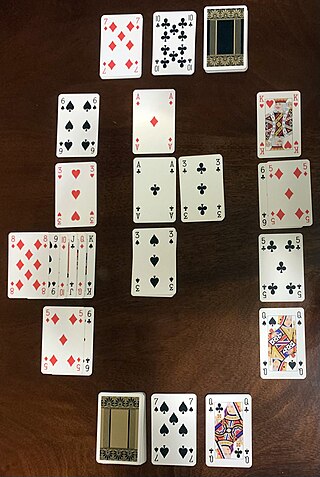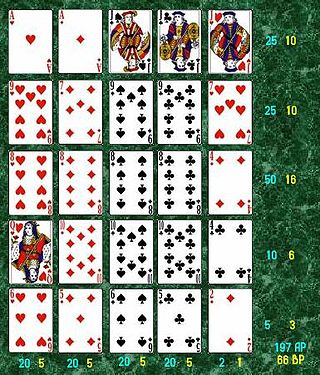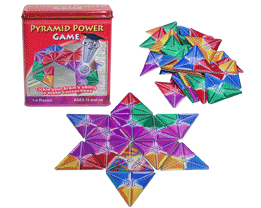
Dots and boxes is a pencil-and-paper game for two players. It was first published in the 19th century by French mathematician Édouard Lucas, who called it la pipopipette. It has gone by many other names, including the dots and dashes, game of dots, dot to dot grid, boxes, and pigs in a pen.

Games of patience, or (card) solitaires as they are usually called in North America, have their own 'language' of specialised terms such as "building down", "packing", "foundations", "talon" and "tableau". Once learnt they are helpful in describing, succinctly and accurately, how the games are played. Patience games are usually for a single player, although a small number have been designed for two and, in rare cases, three or even four players. They are games of skill or chance or a combination of the two. There are three classes of patience grouped by object.
Spit is a card game of the shedding family for two players. It is a form of competitive patience. The game is played until all of a player's cards are gone. It has a close variant known as Speed. Spit appears to have originated in the UK in the 1980s.

Concentration is a round game in which all of the cards are laid face down on a surface and two cards are flipped face up over each turn. The object of the game is to turn over pairs of matching cards.
Spite and Malice, also known as Cat and Mouse, is a relatively modern American card game for two or more players. It is a reworking of the late 19th century Continental game Crapette, also known as Russian Bank, and is a form of competitive solitaire, with a number of variations that can be played with two or three regular decks of cards.

Tantrix is a hexagonal tile-based abstract game invented by Mike McManaway from New Zealand. Each of the 56 different tiles in the set contains three lines, going from one edge of the tile to another. No two lines on a tile have the same colour. There are four colours in the set: red, yellow, blue, and green. No two tiles are identical, and each is individually numbered from 1 through 56.

Golf is a card game where players try to earn the lowest number of points over the course of nine deals.

Russian Bank, Crapette or Tunj, historically also called Wrangle, is a card game for two players from the patience family. It is played with two decks of 52 standard playing cards. The U.S. Playing Card Company, who first published its rules in 1898, called it "probably the best game for two players ever invented".

Poker Squares is a patience game with the objective of building the best poker hands using just 25 cards from the deck. It rewards both lucky guessing and accurate calculation of odds.
Scrabble variants are games created by changing the normal Scrabble rules or equipment.
Cribbage Squares, occasionally Cribbage Square, is a patience or card solitaire based on Cribbage which can be played using a deck of playing cards. This game works the same way as Poker Squares, but with cribbage scoring.

Banqi or Half Chess, also known as Dark Chess (暗棋) or Blind Chess (盲棋), is a two-player Chinese board game played on a 4×8 grid, or half of the xiangqi board. Most games last between ten and twenty minutes, but advanced games can last for an hour or more. Banqi is a social game, usually played for fun rather than serious competition. A more formal version of Banqi may have evolved into the games Jungle and modern Luzhanqi.

Ingenious is the English name for Einfach Genial, a German abstract strategy board game designed by Reiner Knizia under commission from Sophisticated Games and published in 2004 by Kosmos. Across most of Europe it is titled as the local translation of Ingenious or Simply Ingenious, the notable exception being Mensa Connections in the UK.

Rubik's Games is a, five games in one, PC game created for Windows 95/98 developed in part by Ernő Rubik with Androsoft and was published by Hasbro Interactive. It was part of Hasbro's classical games collection of PC related games, translating their most famous board games into best possible quality video games. A history of the Rubik's Cube and its inventor, written out in a webpage type file, with pictures is available from the Menu.

Bananagrams is a word game invented by Abraham Nathanson and Rena Nathanson of Cranston, Rhode Island, wherein lettered tiles are used to spell words.

Pyramid Power is a tile game, where the goal is to score points by placing triangle-shaped tiles next to other triangle-shaped tiles so that the colors on the touching faces match. Doing so scores the player points. It was published by Winning Moves Games USA in 2008 and is one of three games in their Brain-Ade line of quick puzzle games and features both multiplayer and solitaire versions. This game is no longer in production.

Qwirkle is a tile-based game for two to four players, designed by Susan McKinley Ross and published by MindWare. Qwirkle shares some characteristics with the games Rummikub and Scrabble. It is distributed in Canada by game and puzzle company Outset Media. Qwirkle is considered by MindWare to be its most awarded game of all time. In 2011, Qwirkle won the Spiel des Jahres. A sequel, Qwirkle Cubes, was released by Mindware in 2009.
Android is an adventure board game designed by Kevin Wilson and Dan Clark, published in 2008 by Fantasy Flight Games. Set in a dystopian future, where the Moon is colonized and androids and clones are real, players take on the roles of murder investigators, investigating a murder within the fictional cities of New Angeles and Heinlein, a colony on the Moon. Players attempt to gain Victory Points by solving the murder, solving the conspiracy, and/or resolving the investigators' personal issues. The player with the most Victory Points wins the game.

A tile-matching video game is a type of puzzle video game where the player manipulates tiles in order to make them disappear according to a matching criterion. In many tile-matching games, that criterion is to place a given number of tiles of the same type so that they adjoin each other. That number is often three, and these games are called match-three games.

The following is a glossary of terms used in dominoes. Besides the terms listed here, there are numerous regional or local slang terms. Terms in this glossary should not be game-specific, i.e. specific to one particular version of dominoes, but apply to a wide range of domino games. For glossaries that relate primarily to one game or family of similar games, see the relevant article.















